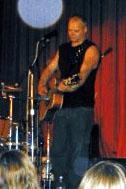
Comment
on this story
What:
Fred Eaglesmith with Malcolm Holcombe
When:
Thursday, Sept. 27 at 9 p.m.
Where:
Blue Cats
Cost:
$8 advance at Tickets Unlimited Outlets or 656-4444/$10 at the door.
|
|

Fred Eaglesmith's deadpan rock 'n' roll laughs and cries
by Jesse Fox Mayshark
Fred Eaglesmith is sitting at home in Southern Ontario, trying like everyone else to make sense of things happening outside the rural world he grew up in and mostly sings about.
"Things in Canada are very strange, because Canadians generally give America a bad rap, and all of a sudden people are walking down the street with American flags," he says in a genial rasp. "It's like, where were you last week? I'm sort of always at parties going, 'You know what, [Americans] are good people, they're not their government.'"
But don't confuse Eaglesmith with Lee Greenwood. He's a self-identified product of the singer-songwriter generation, the "peace generation" he calls it, who grew up listening to Bob Dylan and watching the consequences of ill-conceived war. His affection for the United States stems not from any continental jingoism but from a heartfelt embrace of its culture and especially its music—an embrace that U.S. audiences have returned in kind over the past 10 years. A farmer's son who grew up with eight brothers and sisters on a 200-acre Ontario homestead, he bonded early and naturally with the country and rock music that seeped across the border from stations like West Virginia's WWOL. It quickly put him at odds with his sternly Christian family.
"I was raised on religion, agriculture and poverty," he says with a laugh, "and that's the formula to make a rock 'n' roll musician."
Rock 'n' roll is as good a name as any for what Eaglesmith plays, a raucous blend of aching honky-tonk, rockabilly shuffle and clattering country that sometimes (especially in concert) approaches the intensity of punk rock. His 10 albums on a variety of independent roots labels, including his own recently founded and jokingly named A Major Label, have earned him a small but fiercely devoted following—"fredheads," he calls them affectionately. They include many of his peers; Cowboy Junkies recorded his migrant worker's lament "Carmelita," and Australian alt-country prodigy Kasey Chambers performed two Eaglesmith songs back to back during her most recent Knoxville show. They're drawn by his gravelly drawl and his effortless melodies and most of all by the off-kilter emotional force of his songwriting.
A Fred Eaglesmith song can crack you up, as in his many loving odes to redneck culture ("White Trash," "Big Hair," "Benchseat Baby"); or it can break your heart ("Water in the Fuel," "Crashin' and Burnin'"). At their best, they do both at once. In "Time to Get a Gun," the narrator's sense that he's losing control of his life takes the form of firearm envy ("I could afford one, if I did just a little less drinkin'"). In "Spookin' the Horses," a man watches in bewilderment as his wife starts wearing more make-up, buying expensive dresses and going out every night. "You're spookin' the horses," he laments, "and you're scarin' me."
It's one of several songs he's written about the confusing ways relationships can change—an unusual topic, when you think about it. Most songs tend to focus on the infatuation of new love or the aftermath of break-ups, not all the stuff that happens in between.
"I've never figured out the relationship thing," says Eaglesmith, who has three children. "I've never figured out how people stay in them. I've never figured out how people could stay in them. Although I've had and continue to have committed, long-term relationships.
"But," he adds with a rueful laugh, "the emphasis is on the 's' in relationships."
That could partly be a consequence of Eaglesmith's restless wandering. He averages some 250 shows a year across the U.S. and Canada (this is his third visit to Knoxville in as many years). He recently replaced his 1976 tour bus with, well, another 1976 tour bus. "The other bus is now a parts bus," he says. It broke down in West Memphis, Arkansas. After a questionable repair job—"Buford ripped me off for 3,800 U.S. dollars," he says—the old bus was left without any reverse or high gear. "We couldn't go backwards. We had to drive in circles all the way down to Texas and back to Ontario."
So it's not surprising that Eaglesmith's other great song topic is transportation—specifically, automobiles and locomotives. As both metaphoric and literal objects of infatuation, they roar through songs like "Freight Train," "Mighty Big Car," "Pontiac," and, of course, "I Like Trains." He says he's fascinated not so much by the machines themselves (although he does own a 1940 Dodge pickup—"I have to take my coveralls whenever I drive it, because it breaks down every 20 miles") as by the way people relate to them.
"It's a pretty cool thing in a weird way, in a kind of twisted way, somebody's obsession with a thing that won't feel back," he says. "I love that thing about people, that they get more attached to inanimate objects than they do to humans."
As for his own passion, writing and singing songs, Eaglesmith admits that it can seem kind of trivial when people are talking about war and destruction. "I'm not curing cancer or anything," he says. "At a certain point in my life, I realized that I'm just an entertainer. But it does provide some kind of service."
He had a concert scheduled last weekend that he thought about cancelling, given the North American glumness that had set in. He was glad that he didn't. "I just saw people light up and have fun. And I thought, if that's my service, that's not a bad little service."

September 20, 2001 * Vol. 11, No. 38
© 2001 Metro Pulse
|